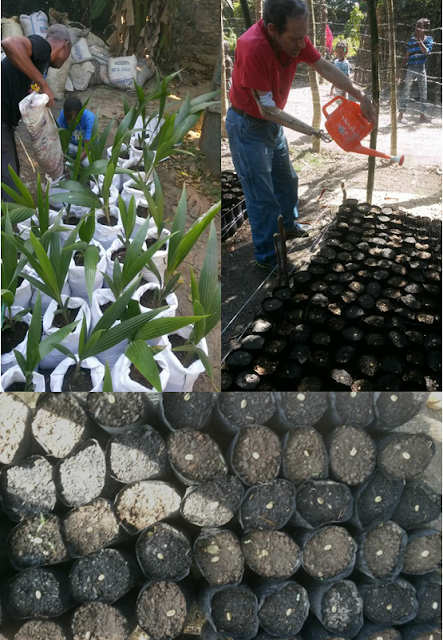Soil Science in Haiti
F2F volunteer Eli Gottfried collaborated with F2F Country Director, Benito Jasmin, on a soil fertility assignment. During his assignment, he conducted a series of experiments in order to (1) figure out ways to lower the pH level of coffee seedlings in a cost-efficient manner; (2) add nutrients to the soil to promote growth, and; (3) control common diseases
on coffee plants. The results of these experiments will ultimately help other crops like coconut and cacao that are grown by Makouti Agro Enterprise since they share similar nutritional compounds to coffee. Some of the experiments are set to run for 6 months, so we
will await the results!
Coffee
seedlings grow best in slightly acidic environments, so Eli set up
experiments to analyze seedling growth in a variety of conditions. These experiments included: (1) spacing out seedlings to see how this
affects growth; (2) the effects of different dilutions of urine of pH levels when applied to
seedlings; (3) the effects of long and short bag planting and; (4) tire planting
effects on seedlings. From the short-term observations of these experiments, Eli
suggested soil mixtures that will promote growth in seedlings.
Eli and Benito also worked directly with thirty six agronomy students to test six different composts of fresh animal manure to measure its nutritional components to ultimately find a manure that will be a cost-efficient and a sustainable additive to lower the pH levels in the soil, which should improve soil health. The students responded extremely well to the field demonstrations and the material presented by Eli. Benito is making efforts to organize weekly or monthly lessons for the students to supplement their agronomy lessons with practical and theoretical demonstration classes. Eli left behind several topical materials for these lessons.
Eli and Benito also worked directly with thirty six agronomy students to test six different composts of fresh animal manure to measure its nutritional components to ultimately find a manure that will be a cost-efficient and a sustainable additive to lower the pH levels in the soil, which should improve soil health. The students responded extremely well to the field demonstrations and the material presented by Eli. Benito is making efforts to organize weekly or monthly lessons for the students to supplement their agronomy lessons with practical and theoretical demonstration classes. Eli left behind several topical materials for these lessons.


.png)

Comments
Post a Comment